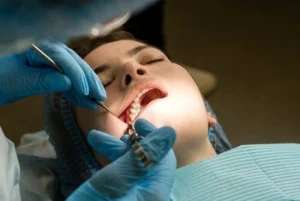Taking care of your teeth and gums is more than just about having a bright smile. The condition of your mouth is closely connected to your general health, affecting issues such as diabetes and heart disease. Neglecting proper oral hygiene can result in complications like tooth decay, gum disease, persistent bad breath, and even oral cancer. Fortunately, improving your oral hygiene routine doesn’t have to be complicated. By developing good habits, choosing the right dental care tools, and making healthy lifestyle decisions, you can preserve strong teeth and maintain healthy gums for life.
This guide will walk you through everything you need to know about how to improve oral hygiene, from brushing and flossing techniques to diet, dental visits, and more.
Why Taking Care of Your Oral Hygiene Is More Important Than You Realise
Your mouth is the gateway to your body. The condition of your teeth and gums has a major impact on your overall health, and poor oral care can lead to serious consequences. Harmful bacteria in the mouth may lead to plaque buildup, gum inflammation, and infections that may spread beyond the mouth.
Studies have found that inadequate oral hygiene is associated with a range of health conditions, including:
- Heart disease: Bacteria in the mouth can travel into the bloodstream, potentially raising the risk of heart-related complications.
- Diabetes: Gum disease can disrupt blood sugar regulation, making it more challenging to keep levels under control.
- Low birth weight: Pregnant women affected by gum disease are at a high risk of delivering babies with low birth weight.
- Oral cancer: Routine dental checkups support early detection of abnormal changes in the mouth.
In short, good oral hygiene is not just about a healthy smile; it’s essential for your overall health.
Brushing the Right Way: More Than Just a Daily Habit
Brushing is a key part of maintaining good oral hygiene, yet it’s something many people don’t do as effectively as they could. To keep your teeth and gums in great shape, follow these simple steps:
- Brush your teeth twice a day using a soft-bristled toothbrush to ensure complete cleaning while being gentle on your gums.
- Opt for a fluoride toothpaste to strengthen tooth enamel and help prevent tooth decay.
- Use gentle, circular motions to carefully remove plaque while avoiding gum irritation.
- Hold your toothbrush at a 45-degree angle to the gum line to effectively target areas where bacteria are likely to accumulate.
- Brush for at least two minutes, ensuring you clean every surface of your teeth, including the back and chewing areas.
Regular brushing helps prevent plaque buildup, reduces the chances of developing gum disease and helps maintain fresh breath.
Why Flossing Matters: A Small Step That Makes a Big Impact
Brushing alone cannot reach all the food particles and bacteria between your teeth. This is where dental floss comes in. Flossing daily clears away plaque and food particles that brushing cannot reach, reducing the risk of cavities and gum irritation.
Tips for effective flossing:
- Carefully guide the floss between your teeth, avoiding any forceful snapping.
- Curve it into a C-shape around each tooth and move it up and down along the gum line.
- Use a clean section of floss for each tooth.
If using regular floss is challenging, you might try a water flosser, which uses a steady stream of water to eliminate debris between teeth and along the gum line.
Don’t Forget Your Tongue and Cheeks
Harmful bacteria don’t just live on your teeth and gums. They can also accumulate on your tongue and cheeks, contributing to bad breath and other oral health problems. Use a tongue scraper or the reverse side of your toothbrush to clean your tongue each day.
How to Prevent Gum Disease and Keep Your Gums Healthy
Gum disease plays a significant role in the loss of teeth and often develops as a result of inadequate oral hygiene. It starts as a mild form called gingivitis, which causes bleeding gums and inflammation, but it can progress to a severe form known as periodontitis, leading to loose teeth, gum recession, and bone loss.
 To keep your gums healthy:
To keep your gums healthy:
- Practise regular brushing and flossing to remove plaque and food particles.
- Schedule routine dental visits for thorough checkups and professional cleanings.
- Avoid smoking, which can lower blood flow to the gums.
- Follow a balanced diet packed with vitamins and minerals to support strong, healthy gums.
Early detection of gum disease is key. If you experience symptoms such as bleeding gums, ongoing bad breath, or receding gums, book an appointment with your dentist as soon as possible.
Lifestyle Habits That Support Good Oral Health
Improving your oral hygiene goes beyond brushing and flossing. Your daily lifestyle habits have a major impact on preventing oral health issues and keeping your mouth healthy.
Choose a Tooth-Friendly Diet
What you eat has a direct impact on your oral health. Certain foods feed harmful bacteria and contribute to tooth decay, while others help strengthen teeth and gums.
Healthy diet tips:
- Try to avoid excessive sugar consumption, as it can lead to increased plaque buildup.
- Incorporate crisp produce like apples and carrots into your diet to aid in naturally cleaning your teeth.
- Strengthen your tooth enamel by including calcium-packed options like dairy, leafy greens, and almonds in your meals.
- Drink lots of water to help keep your mouth moist and clear out food debris.
Cut Back on Smoking and Alcohol for Better Oral Health
Smoking is a main contributor to gum disease, oral cancer, and tooth loss. It decreases blood flow to the gums, delays healing, and weakens the immune system. Alcohol can also cause dry mouth and raise the risk of oral cancer. Quitting smoking and limiting alcohol intake are huge steps toward better oral health.
Regular Dental Checkups: Your Strongest Defence Against Oral Health Issues
Even the best oral hygiene routine can’t replace professional care. Visiting your dentist regularly helps catch potential problems early, making treatment easier and more effective.
 According to the Australian Dental Association, you should visit your dentist at least twice a year for a checkup and cleaning. During these visits, your dentist will:
According to the Australian Dental Association, you should visit your dentist at least twice a year for a checkup and cleaning. During these visits, your dentist will:
- Eliminate hardened plaque (tartar) that regular brushing and flossing are unable to get rid of.
- Watch for early indicators of tooth decay, gum disease, and oral cancer.
- Monitor for loose teeth, gum recession, and other changes that could affect oral health.
- Offer advice on brushing techniques, fluoride toothpaste, and oral hygiene products.
Early detection is especially important for conditions like oral cancer and certain health conditions that may affect oral health, such as diabetes.
Special Considerations: Oral Health and Overall Health
Your mouth doesn’t exist in isolation. Neglecting oral hygiene can have body-wide effects, and some medical conditions may further compromise your teeth and gums.
- Diabetes: People with diabetes are more prone to gum disease due to decreased immune function and slower healing.
- Heart disease: Gum problems have been linked to a greater likelihood of developing cardiovascular conditions.
- Pregnancy: Hormonal changes can affect oral health and increase the risk of gum inflammation.
- Older adults: Dry mouth, medication side effects, and decreased dexterity can make oral hygiene more challenging.
Managing these conditions and working closely with your dentist and healthcare providers can help you maintain good oral health and overall health.
The Bigger Picture: Oral Hygiene and Your Quality of Life
Maintaining good oral hygiene does more than prevent cavities and gum disease. It improves your confidence, supports clear speech, allows you to enjoy a wider range of foods, and enhances your overall quality of life.
Neglecting your oral health, on the other hand, can lead to discomfort, pain, tooth loss, and even more serious systemic health issues. By investing a little time each day into your oral hygiene routine, you’re investing in your long-term health and well-being.
Key Takeaways for a Healthier Smile and Better Oral Health
Learning how to improve oral hygiene is one of the most valuable investments you can make in your health. A healthy smile goes far beyond appearance; it reflects the health of your entire body. By brushing and flossing daily, eating a nutritious diet, visiting your dentist regularly, and making smart lifestyle choices, you can prevent oral health problems before they start.
Your teeth and gums deserve care and attention every day. With the right habits, you’ll enjoy a lifetime of healthy teeth, fresh breath, and a confident smile.
To learn more about improving your oral health or to book a dental check-up, contact Advanced Dental Care at (02) 6188 7103.
References
NHS. (n.d.). Take care of your teeth and gums. Retrieved from https://www.nhs.uk/live-well/healthy-teeth-and-gums/take-care-of-your-teeth-and-gums/
American Dental Association. (n.d.). Retrieved from https://ada.org.au/
MouthHealthy. (n.d.). Flossing. Retrieved from https://www.mouthhealthy.org/all-topics-a-z/flossing
Mayo Clinic. (n.d.). Gingivitis — symptoms & causes. Retrieved from https://www.mayoclinic.org/diseases-conditions/gingivitis/symptoms-causes/syc-20354453







